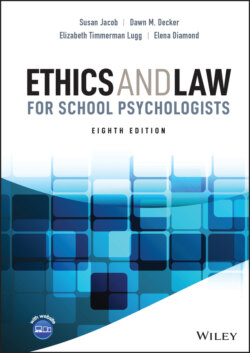Читать книгу Ethics and Law for School Psychologists - Susan Jacob - Страница 52
Complaints to Ethics Committees
ОглавлениеThe APA’s ethics committee periodically publishes an analysis of its actions in the American Psychologist. In 2014 (the most recent report as of November 2020), the APA ethics committee received 68 complaints against members and 52 notices of action pending against a member from entities such as state licensing boards. Complaints were filed against fewer than 1 member per 1,000; notices were received regarding fewer than 1 member per 1,000. Ten new cases were opened in 2014. Based on categorization of the underlying behaviors (rather than the basis for processing the case), problem areas were sexual misconduct; nonsexual dual relationships; inappropriate professional practices (e.g., providing services outside of areas of competence); and false, fraudulent, or misleading public statements (APA, 2015).
NASP’s Ethical and Professional Practices Board (EPPB) typically accepts and investigates only a small number (about 0–5) complaints each year. Complaints accepted in 2016–2017 or more recently involved issues such as the school psychologist’s non-compliance with special education law, the disclosure of sensitive private information to others who have no right or need to know, repeated failure to give meaningful consideration to credible findings from non-school experts, and the practitioner’s responsibility to ensure that intervention results are appropriately monitored. Although the EPPB may recommend suspension or termination of NASP membership, and/or revocation of the NCSP certification, these actions are rare, with only three cases of membership revocation between 2005 and 2020. All three cases involved egregious conduct (NASP EPPB, n.d.).
Because many requests for assistance are handled at the regional level, no precise count of the inquiries to EPPB members is available. Documented inquiries (2016–2017 or more recently) to the EPPB included questions regarding school district noncompliance with special education law, the acceptability of telepsychology assessment, how to report the results of non-standard administration procedures, the screening of students for mental health concerns without parent consent or notice, addressing a colleague with substance abuse issues, and parental requests to be present during an assessment of their child (see Jacob et al., 2021, for further examples).
